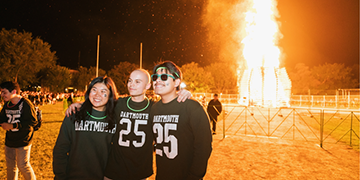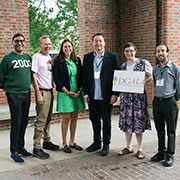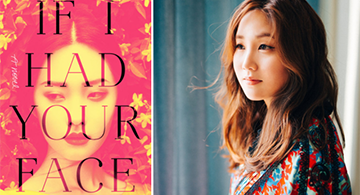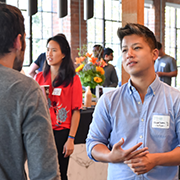Artistic Creation Is for All Students, No Matter Their Major
Set to reopen in 2025, the transformed Hopkins Center will be a hub for student creativity.
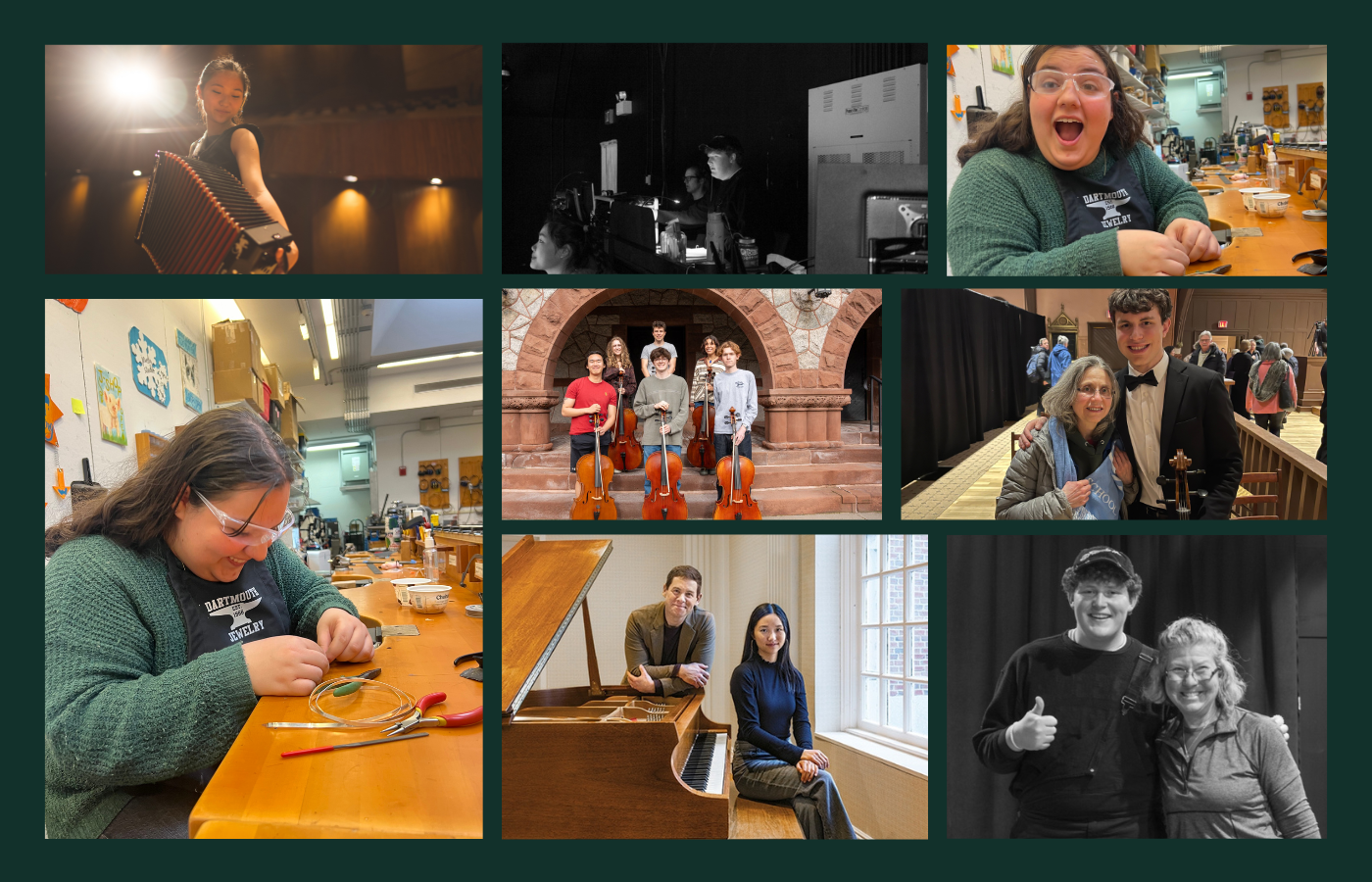
Dec 10, 2024
7 minute read
James Bressor
7 minute read
Creative exploration is at the heart of the Hopkins Center’s renovation and expansion. When the reimagined Hop opens its doors in 2025, it will inspire artistic curiosity and experimentation and invite all students to come inside to explore how the arts can enhance their Dartmouth experience and their lives.
Here, four students who are participating in programs that will be housed in the renovated Hop talk about the importance of artistic creativity in their lives and what about the reimagined Hop excites them. For each of them, artistic expression is a central element of undergraduate life.
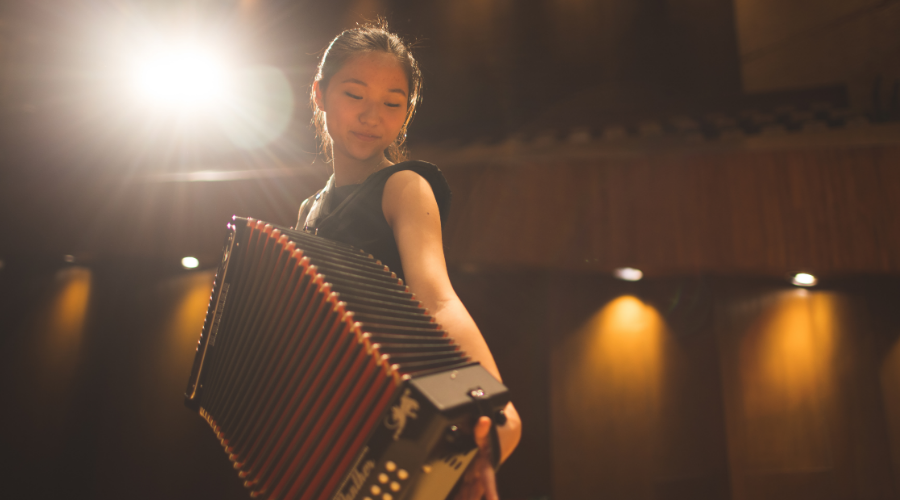
Abigail Pak ’26
Accordionist, percussionist, linguistics major
Abi Pak began playing accordion, an instrument adored by her family with roots from South and North Korea, at age 10. With a background in Latin and European folk music, Abi now plays accordion and percussion as a member of the Dartmouth College Wind Ensemble.
How has artistic creation fit into your Dartmouth experience?
I spoke with Dr. Brian Messier, director the wind ensemble, when I came to campus as a prospective student. He told me about the ensemble and the start of the Mexican Repertoire Initiative, a cross-cultural exchange program that is expanding the availability of authentic repertoire for the band. That’s when I learned the ensemble was playing cumbia music, which is something I had played at home. I have fallen in love with the ensemble and the community of musicians where most of us are not music majors but everyone loves being here.
Has music informed any of your other studies at Dartmouth?
I’ve heard people say music and language are connected, and I believe there are many similarities between the disciplines. This past spring, I took a phonetics class, and we analyzed waveforms, which audio engineers and musicians also do, learning about the anatomy of the vocal folds, etc. And we did a lot of work related to music and pitch. I haven’t found a way to completely connect all of the dots yet, but I can make a bit more of a connection with every class I take, and that helps me understand both disciplines.
Are you headed into an arts career?
For years I was sure I wanted to study music, maybe attend a conservatory. I never considered another academic interest until my senior year of high school when I fell in love with linguistics. Even though I chose not to major in music, I’ve been able to participate and make it a huge part of me, and Dartmouth has been very supportive.
What about the reimagined Hop most excites you?
I’m excited that we’ll have rehearsal space that will be accessible for more hours, and we’ll have a place for the entire ensemble to rehearse—our percussionists haven’t been able to practice. It's hard to transport our large instruments, which has been a blessing in a way because we've been able to go to other places and play at other concert halls, and that has been fun. But we haven’t been able to show what we’re doing to our own school, and it will be really awesome to play on campus and have our friends come to our concerts.

Matthew Jachim-Gallagher ’25
Stage manager, director, theater major
Matt Jachim-Gallagher grew up in New Hampshire and started meeting Dartmouth faculty as a 16-year-old when he had his first internship at White River Junction’s Northern Stage. His love for theater began in fourth grade, when his mother signed him up to act in a show. His real passions, however, are stage management and directing. Matt has stage managed several plays at Dartmouth, including the theater department’s production of Pretty Filthy, Pippin, and Hamlet. He directed the student production of The Last Five Years this past spring.
How has artistic creation fit into your Dartmouth experience?
Stage management is a bridge between the creative and the production teams in a theater production. You need a base of knowledge in several disciplines, which is partly why I chose Dartmouth, because of its liberal arts program. Taking classes in multiple departments helps me communicate more effectively with everyone.
Has theater informed any of your other studies at Dartmouth?
My classes always connect with each other somehow. I can’t really explain it. I recently took “Acting for Comedy,” “Intro to Intercultural Anthropology,” and “Storytelling in the Digital Age.” All three of them have a hard focus on storytelling and making a deep connection. Also, a lot of theater is textual analysis, which I feel like you need for the majority of classes at Dartmouth.
Are you headed into an arts career?
I’ve always wanted to stage manage, and just recently I started focusing on directing as well. I want to work in a place similar to Northern Stage after I graduate. I like the environment of Northern Stage because it’s an educational-based local theater that’s pushing boundaries.
What about the reimagined Hop most excites you?
I love the idea that the Hop is this communal building for theater majors and basically any arts program. People are constantly coming and going, and they get to see all this cool art. Having this one central location makes for so much more connection between people who wouldn’t normally see each other creating art. Many actors in our shows have never done theater before. Because our rehearsals were next door to the café in the Hop, people would watch us rehearse while getting food, and some of them joined us in future shows.

Ava Razavi ’27
Jewelry maker, English and economics double major
Ava Razavi did not arrive at Dartmouth with any experience making jewelry, and she didn’t have a burning desire to visit the Donald Claflin Jewelry Studio, which is located in the Black Family Visual Arts Center during the Hop’s renovation. But one of her First-Year Trips leaders encouraged Ava to visit the studio. A month later—so she could say she had given it a try—Ava stopped by, and she immediately loved it. She is now a student assistant, teaching other students how to use the studio’s tools and equipment.
How has artistic creation fit into your Dartmouth experience?
We’re told growing up that we need get good sleep, do our homework, and work out to be happy and productive. But I’ve always felt there’s been this hole that is only ever filled when I get to do something creative. I also think there’s such tremendous value in the idea of coming into the jewelry studio and having complete agency in what you make.
Has making jewelry informed any of your other studies at Dartmouth?
I’m still breaking things left and right when I make jewelry. But that’s such good practice, especially in an environment like Dartmouth, where there’s a lot of pressure to be perfect all the time. It’s good to accept that things will go awry and deal with obstacles. I came into the studio not knowing anything, and every 10 minutes I’d be asking for help. That’s made me more comfortable asking questions in the classroom. In addition, jewelry-making is very introspective in the sense that, for an extended period of time, you’re focused on twisting a wire or filing a piece of metal. You have time for some self-discovery and to reflect on what you’re curious about.
Are you headed into an arts career?
Making jewelry is a hobby for me. I know there are people who work at the studio who are on track to become jewelers, and that’s awesome. For me, the thing that I love most is this idea of artistic creation without judgment—the idea that I go in, I create something, and no one else judges it.
What about the reimagined Hop most excites you?
I’m excited for the idea of more benches in the studio. We have a lot of regulars who are coming in all the time, and it’s terrific that they like the environment so much that they want to come back. But I also just want new people to come into a place that they feel like they can freely access, so I’m just excited to have more space and more people.

Tyler Grubelich ’26
Cellist, biomedical engineering and music double major
Tyler Grubelich is on the undergraduate pre-med track: he intends to enroll in medical school after receiving his AB. Music, however, will remain a part of his life, he says. Tyler is a cellist in the Dartmouth Symphony Orchestra (DSO) and acts as a manager for the orchestra, helping with behind-the-scenes operations.
How has artistic creation fit into your Dartmouth experience?
I haven’t had any trouble balancing my participation in the DSO with my studies. Maybe that’s because playing the cello isn’t something I have to do. I enjoy going to orchestra rehearsals, so it doesn’t feel like, “Oh, this is another thing on my plate.” It’s almost like a nice break from my pre-med and engineering obligations. The orchestra has a friendly, collaborative environment. It’s not a competitive ensemble with everyone pushing to be first chair or concert master.
Has music informed any of your other studies at Dartmouth?
While music isn’t the subject most directly linked to health care, it has informed my desire to be a doctor. I play my cello for patients twice a week in the lobby of Dartmouth Hitchcock Medical Center. I’m hoping to make a spiritual difference for patients who might be having a hard time. I’ve been told by hospital staff that it calms some patients down. I love seeing how my playing the cello cheers patients up. This has reinforced my desire to be a doctor and pursue both a musical humanities academic track as well as a science track through engineering. There are both scientific and humanistic sides of medicine.
Are you headed into an arts career?
I’m hopefully going to be attending medical school after Dartmouth, but I’d still love to participate in music for the rest of my life.
What about the reimagined Hop most excites you?
As a member of the orchestra, I’m looking forward to expanding our repertoire by playing with full winds and full brass sections again. It will have a different sound than what we’ve been able to create in Rollins Chapel, which is a smaller space that can’t accommodate as many musicians. In my opinion, a strength of the Hop is that there’s such a diversity of people who are participating in the ensembles and giving back to the community. It’s not strictly for music majors, and anyone can participate as long as you’re putting in the time and effort.


